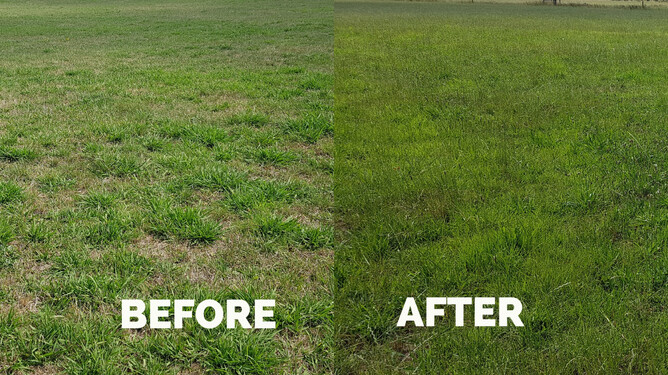The technology behind a product successfully used to improve kiwifruit health and productivity for the past ten years is now available to help pastoral farmers mitigate environmental impacts on-farm while increasing pasture yield and milk and meat production.
Biozest is a pasture spray that has been scientifically proven in research trials to improve the productivity, resilience and quality of pasture. Paddock and farm-scale trials over the past decade have shown Biozest-treated pasture can increase milk and meat production by up to 30% while simultaneously reducing urea excretion by more than 20%.
Certified organic, Biozest, alongside its sister kiwifruit product Agrizest, were conceived by Pukehoke-based biotechnology company Zest Biotech, whose parent company Indigo has carried out research and development trials on both products for more than 20 years. Biozest and Agrizest are manufactured in a new large-scale facility in Waiuku, and were previously produced in Paerata, near Pukekohe.
Indigo founder and entrepreneurial scientist Nathan Balasingham says with farmers under increasing pressure to respond to issues of greenhouse gas emissions and urea excretion from animals, Biozest is a way for farmers to make a positive environmental impact while also significantly increasing pasture yield and milk and meat production.
“For a long time there’s been a common thought in the agricultural industry that reducing farming’s environmental impact had to come at the expense of production, or that increasing production had to come at the expense of the environment,” he says.
“We’ve researched Biozest for over a decade, conducting rigorous trials on-farm and in commercial settings, and we’ve seen Biozest perform exceptionally in terms of increased production, and importantly, its use produces positive environmental effects.”
Biozest works to improve pasture resilience and growth by activating the molecular pattern recognition receptors (MPRR) on plant surfaces. When Biozest is applied to pasture, the plant’s surface receptors trigger the production of bioactive molecules, called phenylpropanoids. Phenylpropanoids help plants overcome stress from pests, disease and environmental effects such as drought and frost, and they increase the conversion of feed in grazing ruminants.
Balasingham says the ruminant digestion process is key to Biozest’s activity. “As a pasture spray it improves growth and resilience, but importantly when treated pasture is consumed it increases ruminant digestion, which our research shows can lead to increased milk and meat production. We’ve seen treated pasture in our trials being more efficiently converted to milk and meat instead of being wasted as methane and urea.”
Addressing environmental concerns
Balasingham firmly believes that addressing agriculture’s environmental concerns should not be seen as an unwanted “extra cost.”
“Reducing urea and greenhouse gases doesn’t need to be viewed as a threat or an attack on farmers – as long as scientists and developers are providing them the tools they need to respond.”
A recent independent review of the New Zealand Agricultural Greenhouse Gas Research Centre (NZAGRC) found the organisation is leading the world in reducing livestock emissions. Balasingham says the report highlights the centre’s strategic thinking is focused heavily on productivity and efficiency, providing a value proposition for greenhouse gas mitigation. He believes the company’s Biozest technology can help further work in this field.
“By ensuring stock is more efficient through enhanced pasture growth, feed digestion and productivity, we believe widespread use of Biozest can reduce the impact on the environment through reduced emissions, such as nitrogen leaching.
“That means farmers can access an environmental solution that won’t reduce productivity and won’t financially cripple rural New Zealand, giving the rural economy a boost and contributing towards a solution to our greenhouse gas problem at the same time.”
Farmers catching on
Stan Matenga, an organic dairy farmer at Mata, near Whangarei, started using Biozest in its early stages of development as part of paddock trials on his farm where pasture production was measured and compared between multiple Biozest-treated paddocks and untreated paddocks. The trials, which ran for one year, all found pasture productivity increased and the pasture consumed doubled.
Aside from increased production, Matenga also noticed positive behavioral changes in his herd. “I’d put a mob of calves into the paddock and they’d immediately head over to the side treated with Biozest,” he says. “The grass looked healthier and the calves seemed to be saying they enjoyed eating it more than the untreated areas.”
As an organic farmer, Matenga says Biozest is a great addition to his toolkit of on-farm environmental measures. “It’s something else I’ve been able to add to my bag of tricks, alongside other organic sprays, seaweed and longer-rooting plants in pasture.”
He says that unlike many traditional sprays, Biozest is safer to handle. “I often say it’s a bit like handling chocolate milk – you don’t have to worry about getting it on your hands or clothing because its food grade and organic.”
Matenga also believes his pasture has recovered better from this year’s summer dry period than in previous years. “Compared to the years we haven’t used Biozest, I’ve noticed this year our pasture had more resilience to dry periods, and I don’t think we’d be in as good a place as we are now if we had not have used it.”

